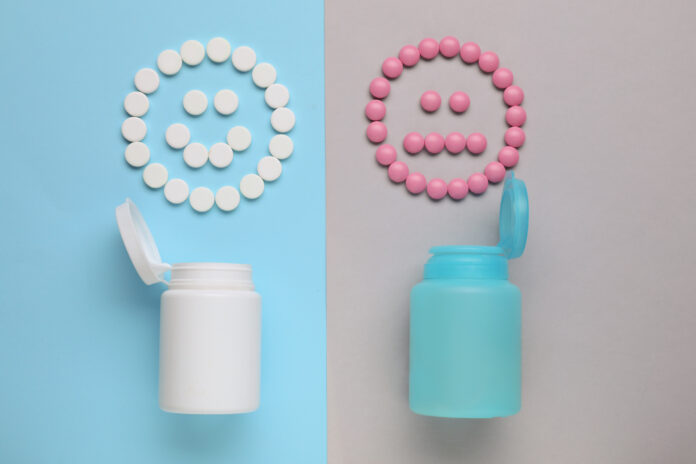We all want to feel happy, and with so many supplements on the market that claim to do just that, you might think “going natural” is safer. Many of us are also looking for ways to increase serotonin without taking a selective serotonin reuptake inhibitor, known as an SSRI. But it’s important to be cautious with supplementation and realize that just because you don’t need a prescription doesn’t mean the supplement is safe.
What Is Serotonin?
Serotonin, or 5-hydroxytryptamine (5-HT), is a chemical in the human body that carries messages between nerve cells in the brain and throughout the body. It’s ubiquitous and, therefore, impacts everything from mood and digestion to wound healing, nausea, blood clotting, and sexual health.
This major neurotransmitter regulates mood, anxiety, cognition, and sense of well-being. The other two major neurotransmitters, norepinephrine and dopamine, are chemically similar in that they are all monoamines, says Chris Pagnani, a psychiatrist and instructor at The Johns Hopkins Hospital School of Medicine for the Department of Psychiatry. A monoamine contains one amino group linked to an aromatic ring by a two-carbon chain.
Read More: 5 Essential Neurotransmitters for Everyday Life
How Do SSRIs Work?
SSRIs increase the amount of serotonin available in the brain by blocking the reabsorption of serotonin by the neurons. While these drugs are powerful and have been used for decades to treat depression and anxiety, they have a number of side effects that make them unappealing to some, depending on the variety of SSRI.
For example, they may cause nausea, changes in appetite, drowsiness or insomnia, and changes in sexual desire. Rather than going off the medications entirely, many people may choose to try a different form of the medication.
Read More: What is Anxiety and How Can Worries Overpower Us?
Taking a Serotonin Supplement
According to Maya Feller, a Brooklyn-based registered dietitian and nutritionist, the hope with a serotonin supplement is that it’s going to increase serotonin production so that more of it is available in the brain. “There’s more research on pharmacology than there is on supplementation, which is a big factor,” says Feller.
Supplements may increase the amount of serotonin that’s available in the body, but they’re often not as strong as a pharmacological agent like an antidepressant. “When we’re thinking about pharmacology versus a supplement, pharmacology is much more powerful,” Feller says.
And it’s also important to note that supplementing serotonin doesn’t come without risk, says Pagnani. “[Supplements] are also less regulated than medications, and it is not unheard of that routine auditing will find that the labels on supplements (even those sold at reputable vitamin shops) aren’t completely accurate regarding their contents and dosages,” Pagnani says.
If you buy a supplement, Pagnani recommends choosing a larger, established company with third-party certifications.
Read More: How to Improve Your Mental Health
What Are the Side Effects of Serotonin Supplements?
According to Pagnani, there may be a place for supplements, but only if you talk to your doctor first. And be aware of the side effects, which can include: upset stomach, headaches, dizziness, nausea, low energy, decreased libido, sexual side effects, and vivid dreams.
Additionally, these supplements, which include 5-HT, St. John’s Wart, and others, should not be taken along with an SSRI. “This can cause a potentially fatal condition called ‘serotonin syndrome,’” says Pagnani.
Read More: Do Antidepressants Change Your Personality?
What Is Serotonin Syndrome?
Serotonin syndrome is caused by excessive serotonin in the body, which can lead to shivering, diarrhea, muscle rigidity, fever, seizures, and even death.
What’s more, says Feller, if you’re experiencing depression or anxiety, it’s important to seek help and not try to go it alone. Many people struggling with depression are also in need of therapy in conjunction with medication. Mental healthcare has come a long way, and we can do a lot to help those struggling with depression and anxiety or even those simply going through a difficult time, but you still have to reach out and get the help you need.
Read More: What You Can Do About Seasonal Depression
Source : Discovermagazine








